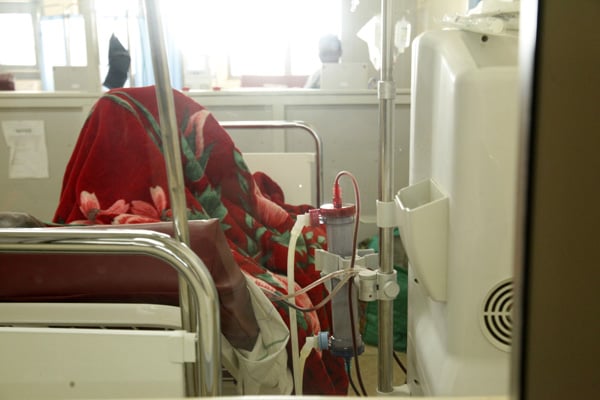Palliative care offering hope to patients in West Nile

Treatment. A patient undergoes dialysis at a hospital in Uganda. Kidney-related diseases also need palliative care. PHOTO/FILE/RACHEL MABALA
What you need to know:
- Palliative care involves a team of doctors, nurses, allied health, and other volunteers, who work together to provide an extra layer of support to the person and their family.
In the heart of Awupi Village, Ayivuni Sub-county, resides Neria Driwaru, a testament to the transformative power of palliative care.
In 2005, her world was shadowed by diagnosis of liver cancer, leaving her devoid of hope.
“I had lost hope of living after I was found to be having cancer of the liver. I could not talk well, or even walk a distance. But since I was enrolled in palliative care in 2006, I can now walk, talk well, dig, and even cook for my grandchildren,” Ms Driwaru said at the weekend.
She said she received counselling from Arua Regional Referral Hospital before medication.
“I feel much better because of the care and support offered to me. I am now hopeful that God can still make me live longer because I keep going for counseling. Since then, I have brought 10 patients to the palliative care unit so that their lives can improve also,” she added.
Her journey epitomises the transformative potential of palliative care, which is echoed by Grace Adiru, who found solace amid her cancer battle through counseling and medication.
“I had to undergo extensive radiotherapy. As I was struggling with pain, my doctor suggested I see the palliative care team to help manage the pain so that I could cope better with the next steps of cancer treatment. I felt some relief due to counselling and the drugs I received,” she said.
Recognising the urgent need to expand access to such vital services, the Rotary Club has embarked on a mission to construct a Palliative Care Unit in Arua City.
This, according to the Past Governor Rotary Club, Ms Royce Androa, would enable more patients to access care and prolong their lives.
“We need to give that service to those disadvantaged people. The terminally ill patients should pass on peacefully with proper care given to them. We need to support this construction so that even those still holed up in homes can access services,” she said during a conference last week.
The Rotary Club Assistant Governor for Northern Area II, Ms Lillian Ayikoru, said: “We hope that through the cancer runs and palliative walk, we can raise funds to build this unit. We cannot continue to look on when our parents, and grandparents are dying in pain. We need to give them hope.”
Statistics
According to the 2023 statistics, at least 4,500 patients from across the West Nile sub-region were registered for palliative care, especially at Arua Regional Referral Hospital from 2013.
In 2018, Arua Regional Referral Hospital had 2,585, and of that, about 722 died due to various illnesses such as cancer, liver diseases, abdominal tract infections, and sickle cells.
Palliative care
Palliative care involves a team of doctors, nurses, allied health, and other volunteers, who work together to provide an extra layer of support to the person and their family.
The teams are commonly involved with illnesses such as heart, lung, or kidney disease, cancer, or advanced dementia. Involving palliative care allows for better control of symptoms and a better quality of life for a patient.




